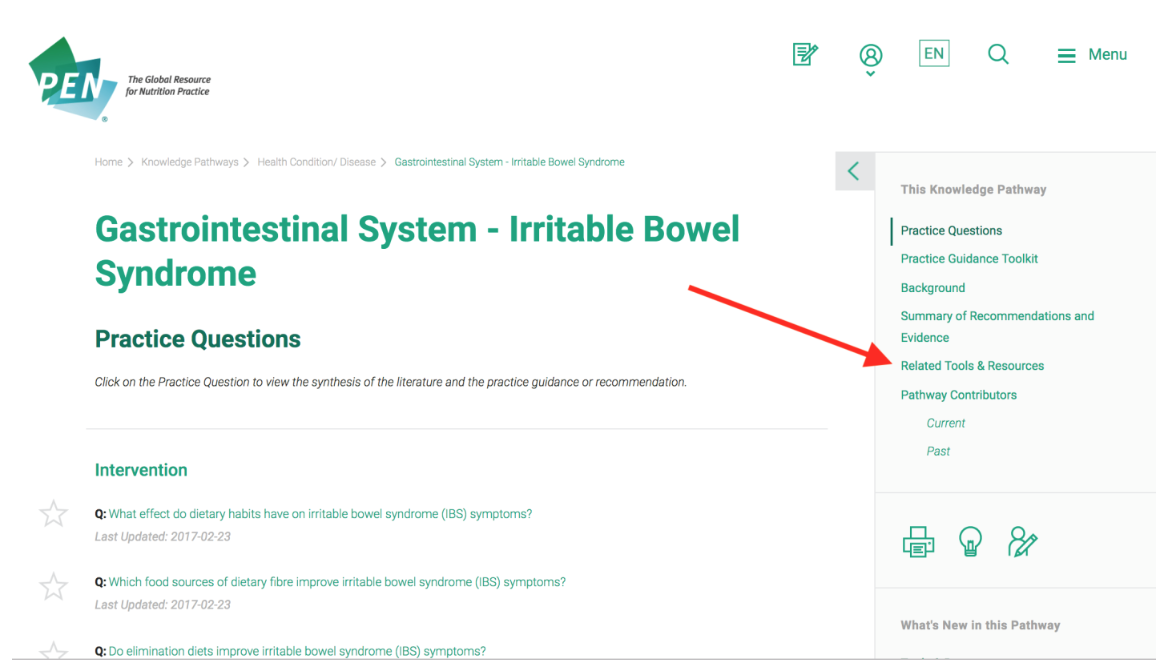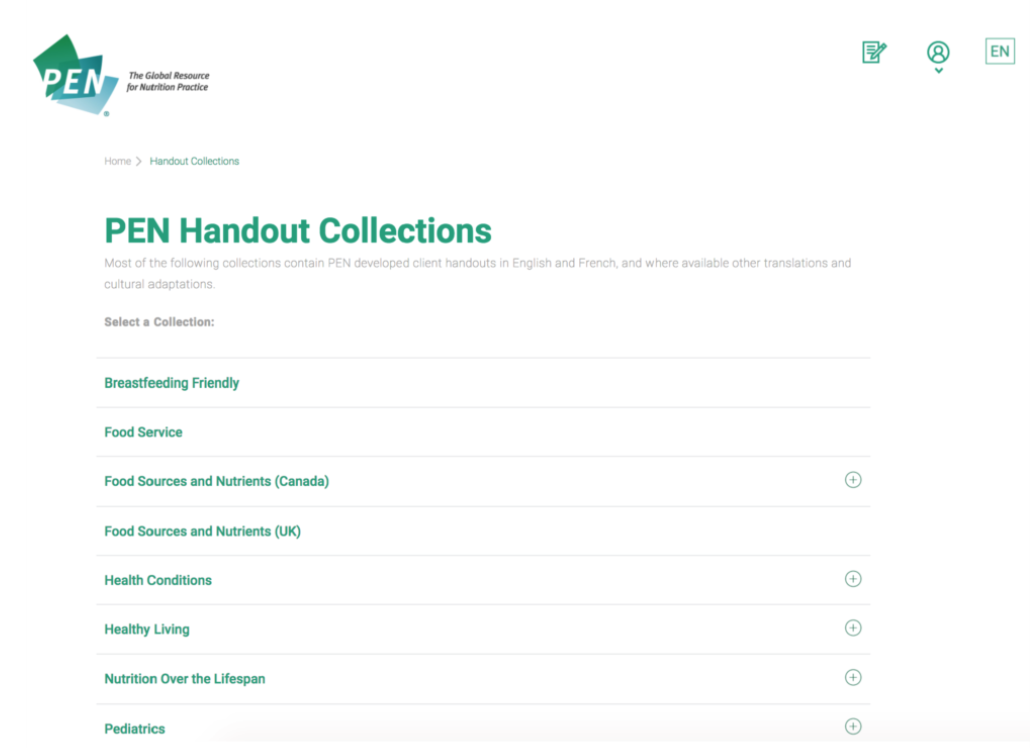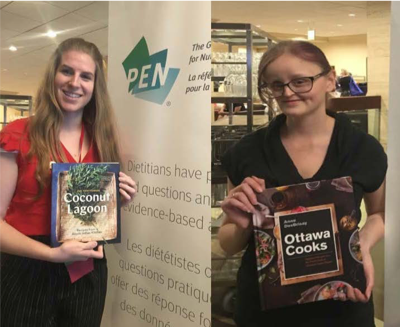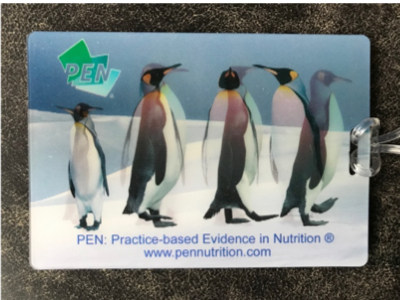PEN eNews 9(1) June 2019
PEN
® eNews is a monthly e-newsletter shared with the global PEN Community and created to help dietitians position themselves as leaders in evidence-based nutrition practice. In addition, users of the PEN System will find articles on the new evidence, resources and features available and how to maximize one's use of PEN.

Welcome to PEN® eNews
The PEN Director was too busy doing her “Happy Dance” to provide an editorial this issue.  Why you ask?
Why you ask?
Well, some of my heroes in nutrition research, critical thinking and evidence-based medicine (BC Johnston, JL Seivenpiper, RWM Vemooij, RJ DeSousa, DJA Jenkins, D Seraatkar, DM Bier, GH Guyatt) published an article entitled: The Philosophy of Evidence-Based Principles and Practice in Nutrition in the Mayo Clinic Proceedings: Innovations Quality and Outcomes. It is an open-access article so please read the entire paper, but I was pretty pleased to see the PEN system acknowledged as a “sophisticated” evidence-based resource. A heart-felt thanks to PEN team members and volunteers present and past, who embody the principles of evidence-based nutrition practice and toil tirelessly to find, appraise and summarize best evidence for the PEN: Practice-based Evidence in Nutrition service so dietitians around the world can use it to support their practices.
Meanwhile another “Happy Dance” was being held at the annual national Dietitians of Canada (DC) conference as the PEN® team helped celebrate access to the PEN® system being part of DC membership! See PEN® Team Makes Connections With Users of the PEN® System!
In this issue of PEN eNews 9(1), we:
- See what is new in the PEN System
- Learn how to sort through PEN’s tools and resources
- Assess the quality of systematic reviews
- Review recent PEN Trending Topics
- Celebrate our 2019 DC PEN Achiever Award winner
- Experience how the PEN team made Connections with users of the PEN System!
- Enjoy PEN eNews 9(1)!
PEN
® eNews may contain links to other external websites.
PENnutrition.com is not responsible for the privacy practices or the content of such external websites. Neither Dietitians of Canada, nor any dietetic associations contributing to or licensing the content in Practice-based Evidence in Nutrition: PEN
® endorse the content, products or services on other websites.
What's New in PEN®
Click on the two links below to see MORE of the new and updated content, tools and resources and the latest  Trending Topics in the PEN® System. Look for the new
Trending Topics in the PEN® System. Look for the new  and updated
and updated  symbols in PEN® System to see more new and enhanced content!
symbols in PEN® System to see more new and enhanced content!
There is even more in the works but we need your help. We are currently looking for reviewers for these topics:
- Cystic Fibrosis — June 2019
- Systemic Lupus Erythematosus — June 2019
- Gerontology — Summer 2019
- Dementia — Fall 2019
- Parkinson’s Disease - Fall 2019
Peer review is an important part of PEN content development. PEN Reviewers are involved in providing feedback on content including knowledge pathways, practice questions, backgrounds and Trending Topics.
Different perspectives are essential in the review process, including those of practitioners and academics from different areas in the country and the world. It is a great way to volunteer and many regulatory bodies recognize PEN reviewing as continuing education credits.
So, what do you need to join our team of more than 300 PEN Reviewers? Take a look at this short presentation. You need to have interest, some time, energy and expertise! We provide guidance and training in how to become a PEN Reviewer. Find out more here.
PEN® Editor's Picks:
PEN® Knowledge Pathway on hemp has just been updated
This knowledge pathway provides information on:
- Health benefits and nutrient content of hemp
- Impact of hemp seed product ingestion on cannabis drug use testing
- Differences between hemp and cannabis
- THC content of hemp
- Industrial uses of hemp
- Hemp safety
- Regulatory issues
See the following:
New practice questions in PEN® System look at weight loss interventions
What is the evidence for any comparative difference in health effects of non-dieting 
or HAES®-based interventions compared to a weight loss approach in individuals with overweight or obesity?
What is the evidence for adverse health effects of multiple periods of weight loss followed by weight regain (i.e. weight cycling, yo-yo dieting)?
Looking for more content related to healthy weight or obesity? The PEN System has seven knowledge pathways, more than 190 practice questions, approximately 90 client tools and resources and more than 200 professional tools and resources in this topic area.
New PEN® Knowledge Pathway on Mental Health
Mental Health is one of the newest knowledge pathways in the PEN System.
Read this knowledge pathway to learn more about the evidence to support specific
dietary supplements for the prevention and treatment of the following conditions:
You can also read the Mental Health Summary of Recommendations and Evidence for an overview of all the key points.
In addition to this knowledge pathway, there are eight more mental health-related knowledge pathways in the PEN System and more than 60 practice questions on a variety of topics.
How Do I … Sort Through the PEN System to find tools and resources?
Here’s how to sort to find the tools and resources in the PEN system:
Go to any Knowledge Pathway of interest (example: Irritable Bowel Disease), and click on Related Tools and Resources on the right hand side of the screen.

You can click on one or all three of the orange boxes (audience, country, language) to sort through the results and find the tools and resources you need:

Available options you can sort by:
- Audience: consumer or profession
- Country: Australia, Canada, Europe, Japan, Ireland, New Zealand, South Africa, United Kingdom, United States
- Language: English, French, Chinese, Gujarati, Hindi, Indigenous Australian languages, Japanese, NA Aboriginal native languages, NZ Maori, Pacific Island languages, Punjabi, South Asian, Spanish, Tamil, Urdu, Vietnamese, Welsh
You can also access all PEN created consumer handouts through the PEN Handout Collection on the PEN home page:

After clicking on the handout collection icon you will be directed to a variety of collections. Each contains PEN developed client handouts in English with most translated into French, and some are also available other translations and cultural adaptations.

Here's an example of handouts available for the Reactive Hypoglycemia under the 'Health Condition' collection:

En - English Fr - French Sp - Spanish Pun - Punjabi Ch - Chinese Vi - Vietnamese
As always, we welcome your feedback.
PEN® Resource Managers:
Jane Bellman MEd, RD
Kerri Staden BSc, RD
jane.bellman@dietitians.ca
kerri.stade@dietitians.ca
How should I Systematically assess Systematic Reviews?
A systematic review aims to retrieve, synthesize and appraise existing knowledge on a topic. It can provide t he best available evidence, which should not be confused with high quality evidence. What do you do when faced with multiple systematic reviews on a topic? The PEN approach to acquire evidence when more than one systematic review is identified is to pick the most recent, highest quality review that most closely represents the PICO question (i.e. relevant population, intervention and outcomes).
he best available evidence, which should not be confused with high quality evidence. What do you do when faced with multiple systematic reviews on a topic? The PEN approach to acquire evidence when more than one systematic review is identified is to pick the most recent, highest quality review that most closely represents the PICO question (i.e. relevant population, intervention and outcomes).
To provide guidance on evaluating the quality of a systematic review, the following information was abstracted from a recent editorial in Canadian Journal of Dietetic Practice and Research, Critically accepting results of nutrition reviews.
It is no surprise that we can feel overwhelmed by the number of research papers published in our field given that over 3 million new scientific papers are published each year from more than 33,000 scholarly English-language journals (1). That is mind-boggling! Systematic reviews (SRs) can help us interpret this vast quantity of literature, by synthesizing the results in a rigorous and transparent way. However, we are also being deluged by SRs – a 2016 study identified close to 700 SRs being indexed in Medline in one month (2). This same study identified that the quality and conduct of reporting in the SRs varied widely.
Standards have been developed to improve the reporting of systematic reviews (e.g. PRISMA for reporting reviews of randomized trials; MOOSE for reporting meta-analysis of observational studies in epidemiology). The quality of reporting a SR, however, may be more of a reflection on authors’ abilities to write the information comprehensively rather than the quality of the review. AMSTAR (A MeaSurement Tool to Assess systematic Reviews) was designed as a practical critical appraisal tool for use by health care professionals who do not necessarily have advanced training in conducting SRs. More recently, AMSTAR 2 was developed with a focus on evaluating reviews of healthcare interventions, which can be particularly relevant to nutrition topics that often include non-randomized studies. In order to base decision-making on real world observational evidence, this tool should assist in identifying high quality SRs.
References
-
International Association of Scientific, Technical and Medical Publishers (STM). The STM Report. An overview of scientific and scholarly journal publishing. Fifth edition. International Association of Scientific, Technical and Medical Publishers: Hague, Netherlands; October 2018 [cited 2019 Apr 18]. Available from: https://www.stm-assoc.org/2018_10_04_STM_Report_2018.pdf
-
Page MJ, Shamseer L, Altman DG, Tetzlaff J, Sampson M, Tricco AC, et al. Epidemiology and Reporting Characteristics of Systematic Reviews of Biomedical Research: A Cross-Sectional Study. PLoS Med. 2016 May 24;13(5):e1002028. doi: 10.1371/journal.pmed.1002028. eCollection 2016 May.
By Dawna Royall, MSc, RD, FDC, Senior PEN Evidence Analyst
Revisiting Trending Topics
In this issue of PEN eNews, we wanted to highlight our
Trending Topics f

eature. Some of you may not be familiar with this feature and so we thought that by sharing some highlighted ones from the past couple of months we can demonstrate how this section in PEN can help you stay on top of key nutrition controversies, new research and complement the more detailed analysis you see in the PEN pathways. Trending Topics can be searched by using the
Popular Tags.
Red Meat, Comparison Diets and CVD
A new meta-analysis of random control studies looked at the effects of red meat consumption and risk factors for  cardiovascular disease (blood lipids, apolipoproteins, blood pressure) (1). The meta-analysis involved 1,803 participants from 36 RCTs that compared red meat diets with diets that replaced red meat with a variety of foods. The study found that the results depended on the composition of the comparison diet: there were improvements in blood lipids when red meat was substituted with high quality plant protein sources but not when replaced with low quality carbohydrates. The senior author of the study, Meir Stampfer, stated: “Asking 'Is red meat good or bad?' is useless,"…. "It has to be 'Compared to what?' If you replace burgers with cookies or fries, you don't get healthier. But if you replace red meat with healthy plant protein sources, like nuts and beans, you get a health benefit" (1).
cardiovascular disease (blood lipids, apolipoproteins, blood pressure) (1). The meta-analysis involved 1,803 participants from 36 RCTs that compared red meat diets with diets that replaced red meat with a variety of foods. The study found that the results depended on the composition of the comparison diet: there were improvements in blood lipids when red meat was substituted with high quality plant protein sources but not when replaced with low quality carbohydrates. The senior author of the study, Meir Stampfer, stated: “Asking 'Is red meat good or bad?' is useless,"…. "It has to be 'Compared to what?' If you replace burgers with cookies or fries, you don't get healthier. But if you replace red meat with healthy plant protein sources, like nuts and beans, you get a health benefit" (1).
PEN Team Comment:
This study combined the results from 36 randomized controlled trials. Randomized controlled trials can give more certainty of the findings. If the trials were well-designed and conducted, the intervention and control groups should be similar, providing confidence that any differences in outcome were due to the intervention compared to the comparison group. The confidence intervals from the individual studies (seen as the horizontal lines for each study in the Figures) were wide, indicating variability in the results and/or small sample sizes.
In addition, this study identified one of the difficulties of nutrition trials: “Inconsistencies regarding the effects of red meat on cardiovascular disease risk factors are attributable, in part, to the composition of the comparison diet” (2).
References
- ScienceDaily. Substituting healthy plant proteins for red meat lowers risk for heart disease. 2019 Apr 9. Available from: https://www.sciencedaily.com/releases/2019/04/190409141808.htm
- Guasch-Ferre M, Satija A, Blondin SA, Janiszewski M, Emlen E, O’Connor LE, et al. Meta-analysis of randomized controlled trials of red meat consumption in comparison with various comparison diets or cardiovascular risk factors. Circulation. 2019 Apr 9;139(15):1828-45. doi:10.1161/CIRCULATIONAHA.118.035225. Abstract available from: https://www.ncbi.nlm.nih.gov/pubmed/30958719
Warning Against Eating Human Placenta
A Canadian Television Network (CTV) news posting writes, “A group of Canadian gynecologists is urging people not to eat the human placenta. A recommendation from the Society of Obstetricians and Gynaecologists of Canada, recently published in the Journal of Obstetrics and Gynaecology Canada, indicates there is no evidence of a health benefit from the practice known as placentophagy and there [is] a potential for serious harm”.
See Additional Information:
New Guidelines on the Risk Reduction of Cognitive Decline and Dementia
The World Health Organization (WHO) has released new evidence-based guidelines,  Risk Reduction of Cognitive Decline and Dementia, developed using the GRADE process. The nutrition section includes conditional recommendations for the Mediterranean diet and a healthy, balanced diet to reduce the risk of cognitive decline and/or dementia; and a strong recommendation not to use supplemental polyunsaturated fatty acids, vitamins B and E and/or a multi-complex supplement for reducing the risk of cognitive decline and/or dementia.
Risk Reduction of Cognitive Decline and Dementia, developed using the GRADE process. The nutrition section includes conditional recommendations for the Mediterranean diet and a healthy, balanced diet to reduce the risk of cognitive decline and/or dementia; and a strong recommendation not to use supplemental polyunsaturated fatty acids, vitamins B and E and/or a multi-complex supplement for reducing the risk of cognitive decline and/or dementia.
The release of these guidelines is timely as the PEN Team is in the early stages of updating the Mental Health - Dementia Knowledge Pathway. Watch for updates in the near future.
Medically-Tailored Home Meal Program Associated with Reduced Inpatient Admissions and Health Care Costs
“Is participating in a medically tailored meal delivery program for medically and socially complex adults associated with fewer inpatient admissions?” (1). The cohort study published in JAMA examining this question looked at weekly home delivery of 10 free ready-to-eat medically-tailored meals (MTMs) (median duration of MTMs was nine months) to 499 individuals who were independently living and had a medical condition (such as heart disease or diabetes). A registered dietitian determined the appropriate diet and meals based on the individual’s health condition(s) as identified by the referring health provider. The authors compared health care use/inpatient admissions (primary data), admission to a skilled nursing facility and health care costs (secondary outcomes) with 521 non-meal recipients who were matched to the recipients (mean [SD] age, 52.7 [14.5] years; 568 [55.7%] female) based on demographics, disease states and neighborhood characteristics. The authors found that those who received MTMs were less likely to have hospital and skilled nursing facility admissions resulting in less overall health care costs.
See this commentary, Food Is Medicine—The Promise and Challenges of Integrating Food and Nutrition Into Health Care, for more information on the study and its results.
Reference
- Berkowitz SA, Terranova J, Randall L, Cranston K, Hsu J. Association between receipt of a medically tailored meal program and health care use. JAMA. 2019 Apr. doi: 10.1001/jamainternmed.2019.0198. [Epub ahead of print]. Abstract available from: https://www.ncbi.nlm.nih.gov/pubmed/31009050
Ultra-processed Foods and Early Death
Researchers continue to explore the relationship between the foods we eat and health outcomes. The British Medical Journal (BMJ) recently published two articles on the health effects associated with the consumption of ultra-processed foods and early death:
effects associated with the consumption of ultra-processed foods and early death:
The National Health Service (NHS) in the U.K. has provided this analysis of the research, which notes the challenges of cohort studies, including the inability to prove cause and effect, the importance of potential confounding factors with observational research, and the difficulty of defining ultra-processed foods. People who frequently eat ulta-processed foods are different in several ways including income, physical activity and smoking habits, from people who eat foods prepared from scratch (1); it is not possible in studies such as these to fully control for these differences. Thus, it is cannot be assumed that the ultra-processed foods actually caused the cardiovascular disease or early deaths or that other aspects of their lifestyle were more important.
In addition, see the February 2019 PEN Trending Topic: The Association Between Ultraprocessed Food Consumption and the Risk of Mortality – What is the Real Deal?
References:
- Schnabel L, Kesse-Guyot E, Allès B, Touvier M, Srour B, Hercberg S, et al. Association between ultraprocessed food consumption and risk of mortality among middle-aged adults in France. JAMA Intern Med. 2019 Feb 11. doi:10.1001/jamainternmed.2018.7289. [Epub ahead of print]. Abstract available from: https://www.ncbi.nlm.nih.gov/pubmed/30742202
Dietitians of Canada is pleased to bestow the PEN Achiever Award Canada to Dr. Andrea Buchholz
Dietitians of Canada is pleased to bestow the PEN Achiever Award Canada to Dr. Andrea Buchholz in recognition of her direct contributions to the PEN System and her role as PEN champion.
champion.
Andrea Buchholz is a Professor of Applied Human Nutrition in the Department of Family Relations and Applied Nutrition at the University of Guelph. She teaches graduate clinical nutrition and undergraduate applied clinical skills, including nutrition-focused physical examination. Her biological research focuses on obesity prevention in families and understanding calcium and dairy consumption habits of Canadians. Her educational research focuses on the impact of patient simulations on students’ learning and practice competence, and the experiences of Canadian dietitians’ experiences in using simulations to learn the Nutrition Care Process. Andrea is a 3M National Teaching Fellow and her hobby is as a comedic improvisor with an improv troupe in Waterloo, Ontario.
Her educational research has become a part of the PEN database in the form of two practice questions which she co-authored with Kaitlyn Vanderleest:
How do patient simulations impact perceived learning and confidence in the education and training of dietetic students and interns?
How do patient simulations impact objective learning in the education and training of dietetic students and interns?
For a number of years Andrea has encouraged students in a graduate nutrition course to repurpose course assignments into PEN content – approximately 6 students have done this with topics such as fecal transplantation to dissonance-based intervention in disordered eating. Andrea describes how this assignment supports students to “gain experience identifying a question relevant to clinical dietetic practice, summarizing and interpreting scientific evidence in support of their practice question, and writing for a professional audience. Thus, the assignment is “authentic” in that it requires students to create a PEN Pathway in exactly the same manner in which a practicing dietitian may do.”
Andrea shared the following regarding the PEN System: “I feel it is important to introduce students – emerging dietetics professionals – to the wealth of information PEN has to offer. In incorporating PEN into the graduate nutrition course that I teach, students become familiar with all aspects of this resource. They also create their own adapted PEN pathway and provide peer review of a classmate’s PEN pathway. Thus, students are ideally positioned to take full advantage of this resource on graduation, when they transition into dietetic practice. The fact that some students in the course have pursued publication of their PEN Pathway has been the “cherry on the cake,” inspiring and motivating future students to consider doing the same. It has been tremendously rewarding to have played a role in introducing and supporting future dietetics professionals and colleagues in the use of this rich, international resource.”
Thank you, Andrea. We are honoured to acknowledge your contribution to PEN content and your leadership and mentorship of future dietetics professionals through the 2019 PEN Achiever award.
PEN Team Makes Connections at DC National Conference
PEN® Team Makes Connections with Users of the PEN® System at the Dietitians of Canada  (DC) National Conference June 5-8, 2019 in
(DC) National Conference June 5-8, 2019 in  our Nation’s Capital – Ottawa.
our Nation’s Capital – Ottawa.
The theme of the PEN® booth this year was: I My PEN® as we celebrated DC members now having access to the PEN® System as part of their DC membership. Lots of positive feedback and interactions with DC members – is good for the soul and the PEN® System!
 As always, the PEN® booth had a light
As always, the PEN® booth had a light  and fun air to it with the PEN® Team ready, willing and able to answer questions from conference attendees.
and fun air to it with the PEN® Team ready, willing and able to answer questions from conference attendees.
PEN Content
Booth participants were invited to sign up to review upcoming content in the PEN® System and to make suggestions for new content to add to the system. Lots of topics were suggested; there are not enough hours in the day to develop them all! We will evaluate content, as we always do, according to criteria developed by P Splett1 to help prioritize topics:
content to add to the system. Lots of topics were suggested; there are not enough hours in the day to develop them all! We will evaluate content, as we always do, according to criteria developed by P Splett1 to help prioritize topics:
To what degree would the topic:
- improve client outcomes
- affect a large patient/client population
- affect high incidence condition or problem
- affect vulnerable population groups
- reduce costs
- build scientific bases linking nutrition to positive outcomes
- improve performance or enhance confidence of practitioners
- affect policy decisions.
1 Splett, PL. Developing and Validating Evidence-Based Guides for Practice. Chicago, IL: American Dietetic Association; 2000.
Braindates
New this year at the conference were “Braindate” sessions, which were described as opportunities to share “because living is learning, everyone has valuable knowledge to share”. People with all types of expertise were encouraged to participate especially if you had anything to share on any of these topics:
- Do you remember a time when you felt you had a breakthrough about something?
- What do people come to you for advice about?
- What personal rituals have improved your life and work?
- What have you learned that you can share with others here, brainstorm and explore?
Members of the PEN® team participated in several Braindates on various topics: non-diet approaches (e.g. HAES®), edible cannabis and gender variant nutritional requirements. The Braindates provided a good opportunity to have some focused discussions on current or upcoming topics for the PEN® System. We hope they will be a recurring opportunity at future conferences.
University Educators and Students
Several university academic staff stopped by the booth to find out about the best ways to use the PEN® System for student assignments. Lots of follow up to do.
Speaking of academics, be certain to read the article in this issue of PEN eNews about Dr. Andrea Buchholz, University of Guelph, this year’s winner of the PEN Achiever Award (Canada) presented at the annual DC Awards ceremony at the conference.
And there were students…

Composite photo of students from Acadia University
It was great to see so many students from across the country at the conference and to see them actively taking part in the members forum, mentoring sessions, winning awards and stopping by the PEN® booth to ask questions or see how they could get involved! Many of them told us what they liked about the PEN® System and two from the University of Saskatchewan gave us permission to use their quotes:
Shea-Lyn Eddleston
“I love PEN®! I use it all the time as a student. Anytime someone asks me a question about nutrition, PEN® is my go-to.”
Ashley Rodman
“I use PEN® with every assignment! It is an awesome resource and so easy to use. Even if I'm asked a question by friends and family I login quickly to double check my facts.”
Jane Bellman from the PEN® Team attended the ‘It All Starts with Students’ event and shared information about using PEN in practice. A number of students came to PEN booth after to learn more.
We also spoke with Emily Quinn, one of the Chairs of the DC Student Network, about having a regular PEN® column in their Network Newsletter as well as having a video to share with her network members about how students can get the best use out of the PEN® System.
Cookbook Winners
Thank you to everyone who stopped by the booth and engaged! Winners of the Ottawa-themed cookbooks for booth participation were:

Brielle Perl Jolene Beauregard

The 3-D luggage tag giveaway was a hit. PEN® goes with you wherever you go!
All-in-all a very active and positive three days of making Connections with our PEN users!
Written by:
Heather Alaverdy MA, RD, PEN® Editor
Beth Armour MEd, RD, PEN® Content Manager
Jane Bellman MEd, RD, PEN® Resource Manager
Dawna Royall MSc, RD, FDC, PEN® Senior Evidence Analyst
Contact Us
Do you have comments, questions or feedback? Please contact us:
Jayne Thirsk RD, PhD, FDC
Director of PEN®
Dietitians of Canada
jayne.thirsk@dietitians.ca
Eleanor Johnstone PG Dip, BSc, RD
Policy Officer (Evidence-based Practice).
British Dietetic Association
globalpen@bda.uk.com
Sally Moloney APD
Public Relations & Marketing Manager
Dietitians Association of Australia
pr@daa.asn.au
PEN eNews
June 2019 Volume
9 (1)
A Publication of the PEN® System Global Partners,
a collaborative partnership between International Dietetic Associations.
Learn more about PEN.
Copyright Dietitians of Canada
. All Rights Reserved.